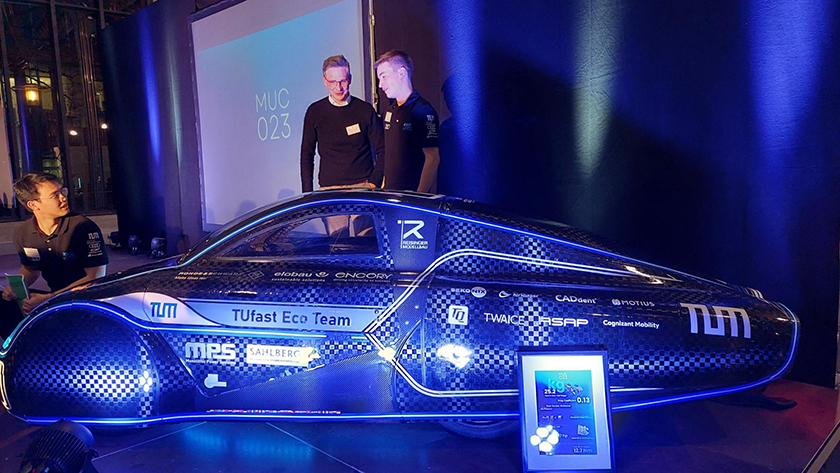More news
- New Managing Director of BASF’s Coatings division
- Global New Material International (GNMI) to acquire Merck’s Surface Solutions busine...
- Delta Coatings unveils plans for global eco-friendly HQ and plant
- PPG recognised for sustainability progress by FTSE4Good for sixth consecutive year
- ChemQuest expands Business Development team, names four VPs

How can you drive as far as possible with one kilowatt hour (kWh) of energy? This was the question posed by the TUfast Eco Team of committed students from the Technical University of Munich, who developed a concept car called ‘muc023’. The team has now been successful in the international car race Shell Eco-marathon and came in second place in terms of efficiency on the track: the range of the muc023 was 242km/kWh – a nice result!
Aerodynamics, a low weight and minimal energy losses were high on the agenda when designing the hyper-efficient city vehicle. Covestro supported the developments with its transparent and lightweight Makrolon® AG RE polycarbonate. With its use in the front and side windows, the plastic helps the electric car weigh just 65kg in total, making it lighter than its driver.
“I am very pleased with the ambition and courage of this young team, which is pursuing the same goal as our company: to commit to the most efficient and sustainable mobility possible,” says Sucheta Govil, Chief Commercial Officer at Covestro. “Similar to the ‘Sonnenwagen’ solar car project, we also support these students in exploring what is possible. In addition, we want to attract young people at leading universities to work with us on solutions for future mobility.”
Makrolon® AG – the abbreviation stands for automotive glazing – was developed for glazing vehicles and is characterised by transparency and light weight. “With the RE variant, we can further increase sustainability by making greater use of alternative mass-balanced raw materials from biowaste and residual materials, as well as renewable electricity for the production of the plastic,” says Dr. Fabian Grote, Head of Global Technical Marketing Mobility in the Engineering Plastics segment. “In this way, we want to help make the circular economy a reality.” The company’s plastics have long been used in the automotive industry, enabling functional and more sustainable solutions with plenty of design freedom.
Less weight, improved aerodynamics
The results of the vehicle development are impressive: While muc023 traveled 242km on one kilowatt hour, today’s electric vehicles can only cover a distance of 5 to 10km with this amount of energy. “In the new prototype, we have once again significantly reduced the weight of the chassis and suspension,” explains Gleb Lialine, head of the TUfast team. “We also improved the aerodynamics, achieving a drag coefficient of just 0.13, and finally installed a more powerful motor and optimised the electrical control system.”
To challenge itself, the team takes part in international motorsport competitions, most recently the Shell Eco-marathon in Nogaro in south western France. At the Paul Armagnac race track, the Munich team competed against university teams from all over the world and came in second place. In addition to the car’s very good efficiency, a newly developed system for autonomous driving was also put to the test, which is operated with cameras and LiDARs as well as various sensors. For LiDAR system requirements, Covestro offers polycarbonate plastics from the Makrolon® ST (Sensor Transparent) product range that are transparent to the corresponding infrared wavelengths and allow sensors to be installed.



